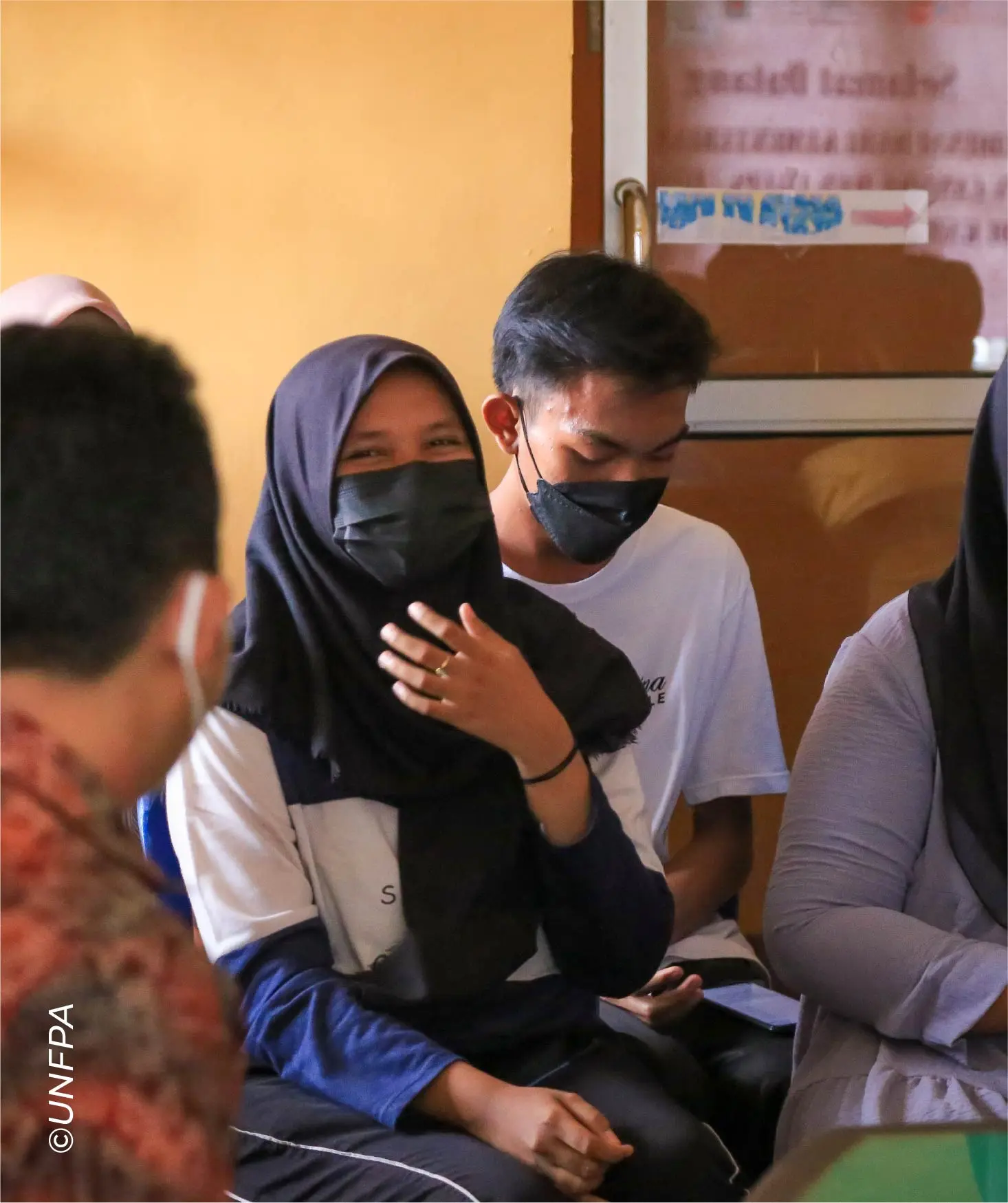United Nations In Indonesia
Country Results Report 2021
Ending Violence against Women, Children and Other Harmful Practices



 Globally, women and children experienced higher rates of violence during the COVID-19 pandemic’s first months, a November 2021 report by the World Health Organization found. The UN is working on multiple fronts to support the government’s efforts to protect human rights, including through eliminating gender-based violence, and ending harmful practices.
Globally, women and children experienced higher rates of violence during the COVID-19 pandemic’s first months, a November 2021 report by the World Health Organization found. The UN is working on multiple fronts to support the government’s efforts to protect human rights, including through eliminating gender-based violence, and ending harmful practices.
Child Protection
In 2021, the UN supported the Government in enhancing the national child protection system and the availability, accessibility, and quality of integrated child protection services. Despite ongoing COVID-19 restrictions, UN interventions reached 12,242 child survivors of violence with health, social work, and law enforcement services in 2021, according to administrative data. The UN also supported the development of two flagship national child protection policies. The draft National Strategy for the Elimination of Violence against Children fully integrates UNICEF’s globally recognized seven strategies to eliminate violence against children, known by their acronym INSPIRE. Meanwhile, the draft Roadmap for Protecting Children Online adopted the #WeProtect Model National Response framework. In addition, the UN supported the Ministry of Education, Culture, Research and Technology in scaling up ROOTS, a school-based model for the prevention of bullying, which by early 2022 was being rolled out with Ministry funding and had trained 55,680 students as ‘agents of change.’ Some 3,712 teachers in 1,856 schools across Indonesia were also trained as facilitators for the ROOTS model.
Other UN interventions on children’s rights contributed to an increase in the proportion of under-fives whose birth was officially registered, increasing to 79% in 2021. The proportion of child marriage declined from 11.2% to 10.35% in 2021.
Workplace Violence and Discrimination
Four UN agencies collaborated to advance the economic empowerment of women and vulnerable populations, and more equal workplaces under the UN’s “Employment and Livelihood” joint program. The Joint Programme worked with the Government to revise the Equal Employment Opportunity guidelines, which were under final review by year’s end. Those guidelines aim to generate lasting change by facilitating the access of disadvantaged groups including people living with HIV (PLHIV) and Key Populations to jobs. On advocacy, the Joint Programme engaged 100 trade union members in a campaign to raise awareness of the importance of inclusive workplaces and a further 15 PLHIV and members of Key Populations to deliver seminars on workplace health, gender equality, and inclusiveness. These 15 trainers led a series of 20 webinars from July to December 2021 targeted at human resource managers, who play a key role in building inclusive labour markets.
The UN also advocated for Indonesia’s ratification of the International Labour Organization’s Convention No. 190 on violence and harassment at the world of work, including producing a review of current national laws on workplace violence and proposing recommendations to the government and employers’ and workers’ organisations.
Gender-Based Violence and Violence
Against PLHIV and Key Populations The UN supported the Government in the development of the National Strategy on the Elimination of Violence Against Women, as well as standard operating procedures for the national referral mechanism for violence against women, called SAPA 129.
The UN also developed a policy paper that proposes inputs to the Anti Sexual Violence Draft Bill, which aims to expand the definition of gender-based violence and create a comprehensive protection and accountability framework. The UN worked with civil society groups to expand advocacy for the bill’s enactment, which also responds to the specific needs of women living with HIV who have been victims of violence. The UN also continued to support the Government’s revision of its methodology for the second national survey on violence against women—a follow-up to 2016’s inaugural survey conducted. The survey’s results, released Dec. 2021, indicated a decreased prevalence of violence against women as compared to the results of the first national survey. Over the past 12 months, 8.7% of 15-64 years reported being victims of violence against women, compared to 9.4 % of respondents in 2016. In 2022, the UN will support an in-depth analysis of the survey’s results.
In 2021, the UN also worked with organizations that provide services for victims of violence against women and organizations that provide support for women living with HIV, with a view to ending stigma and double discrimination. The UN helped strengthen response and referral mechanisms between civil society organisations that support survivors of gender-based violence (GBV), and PLHIV. For example, the UN trained 120 women living with HIV in engaging and supporting victims of GBV, enabling civil society partner IPPI to process 23 GBV cases between September and December 2021. The UN also developed and disseminated new standards of practice on interventions to support women living with HIV who are victims of violence to 10 provinces. To date, Bali has ratified these standards. The UN also developed an activities tool kit to increase male involvement in ending violence against women living with HIV. Two civil society organisations promoted these materials during the 16 Days of Activism Against Gender-Based Violence, resulting in 296,440 Instagram engagements.
Another intervention to support victims of gender-based violence involved replicating the successful model of South Korea’s “Sunflower Centers”—hospital-based one-stop service centres for victims of gender-based violence. The UN helped adapt the Sunflower Centers, including their monitoring and evaluation frameworks, to an Indonesian context thereby enhancing the quality of public services available at hospitals for survivors of GBV.